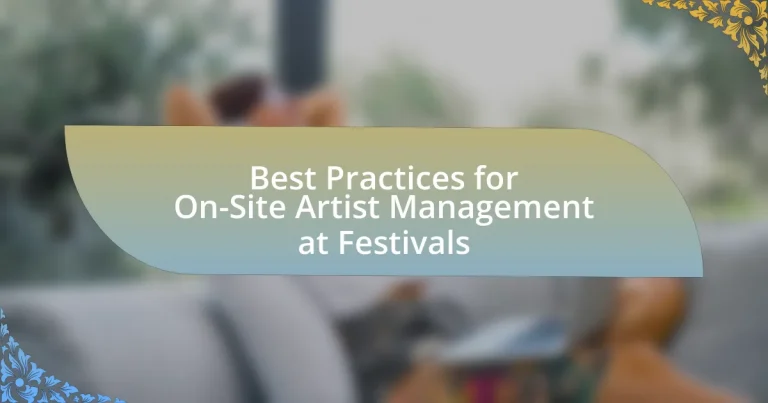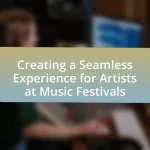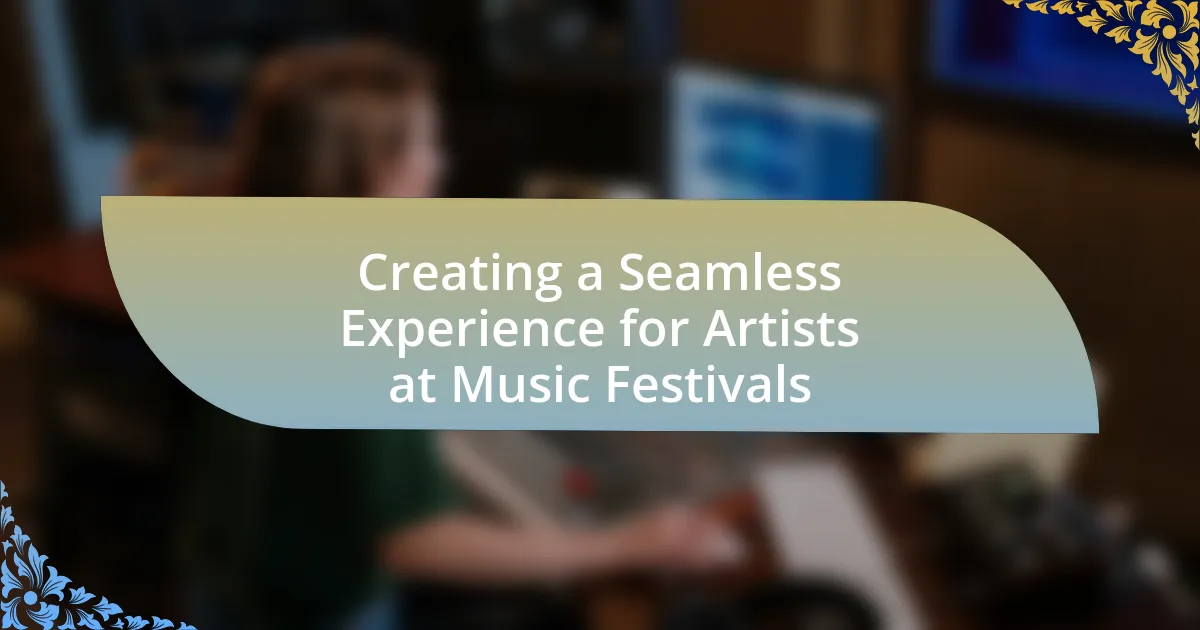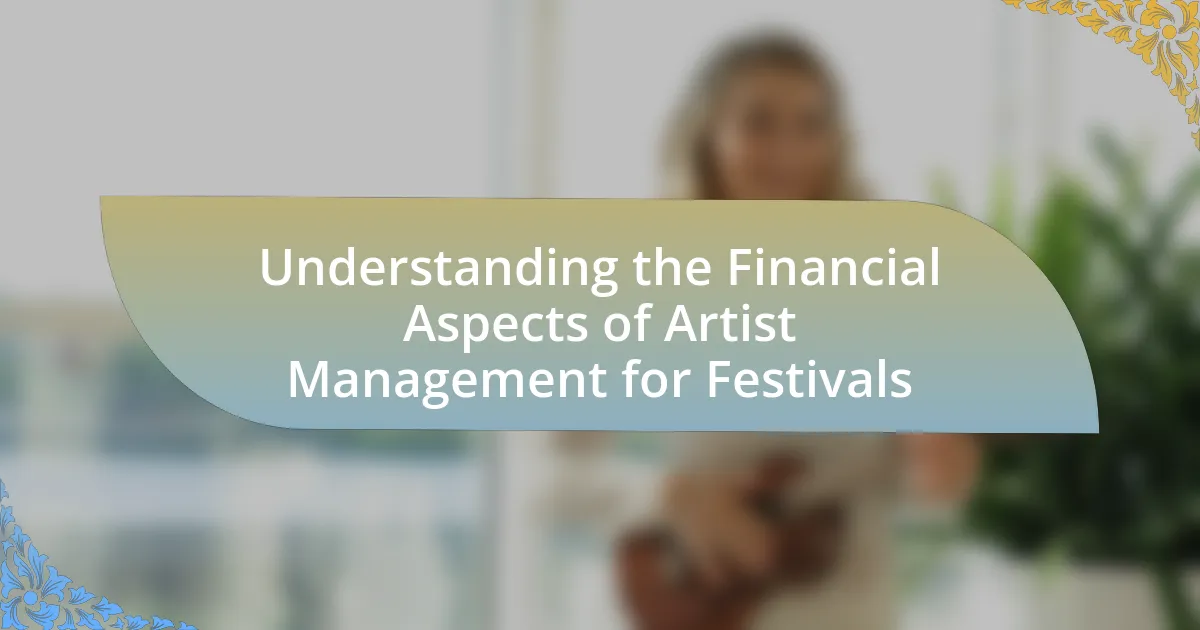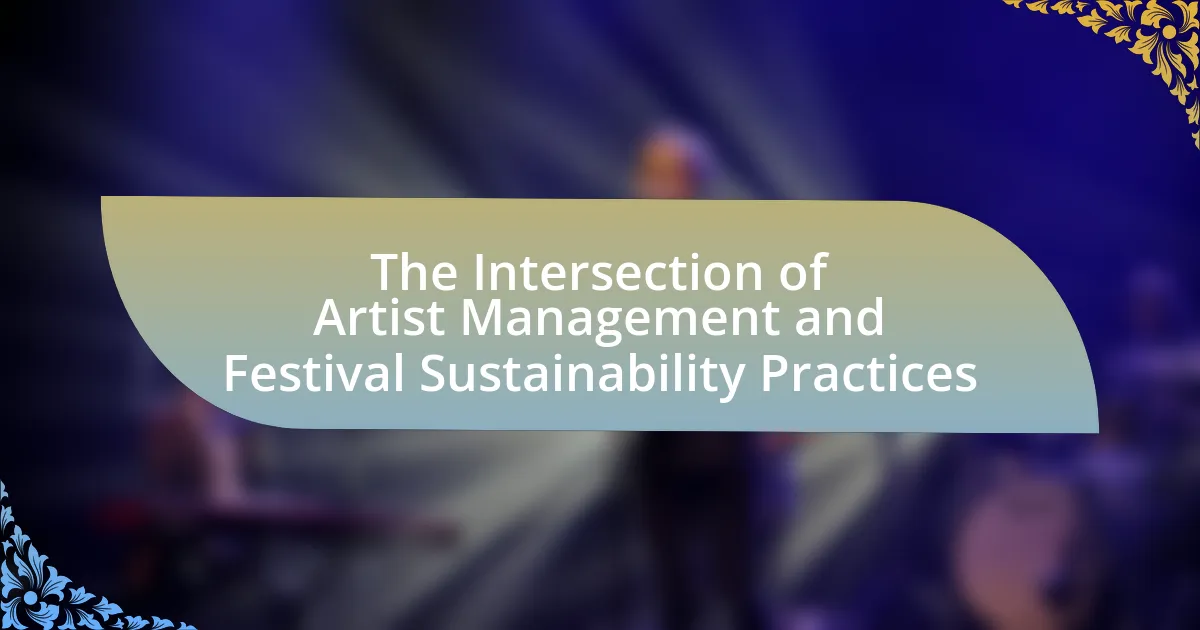The article focuses on best practices for on-site artist management at festivals, emphasizing the importance of clear communication, thorough preparation, and effective coordination among team members. It outlines how effective artist management enhances festival experiences by ensuring timely performances and fulfilling artists’ needs, which leads to higher satisfaction rates among attendees. Key components of successful management include logistical considerations, communication optimization, and addressing challenges faced by artist managers. The article also discusses strategies for improving management practices, the role of technology, and the significance of gathering and implementing artist feedback to enhance future festivals.
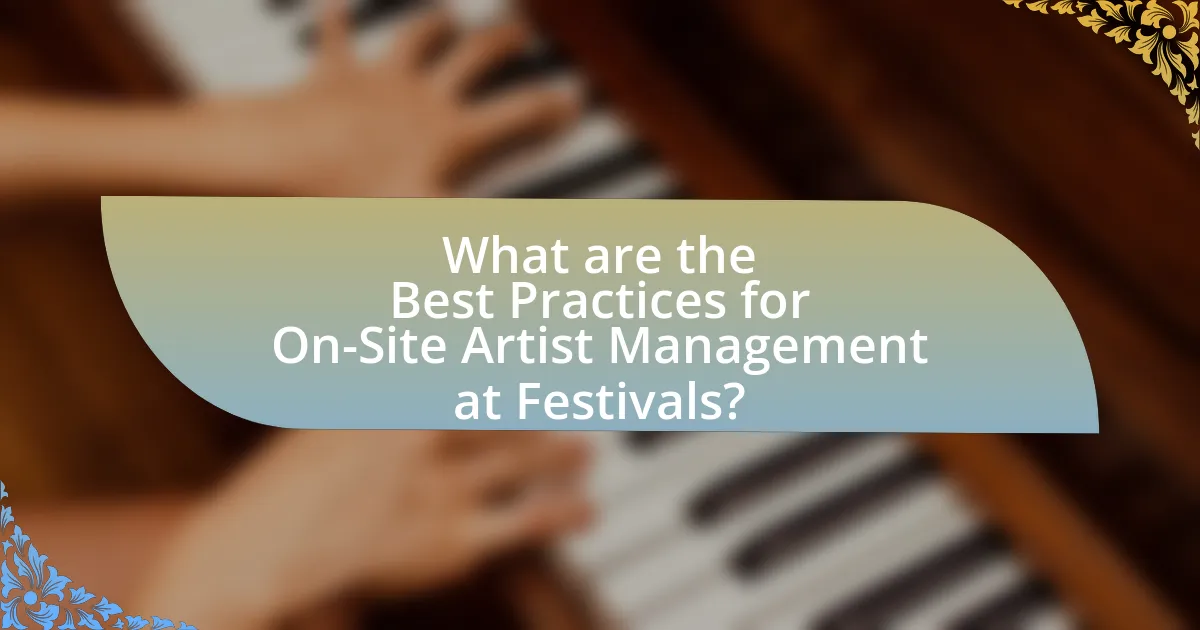
What are the Best Practices for On-Site Artist Management at Festivals?
The best practices for on-site artist management at festivals include clear communication, thorough preparation, and effective coordination. Clear communication ensures that artists understand their schedules, requirements, and any changes that may occur during the festival. Thorough preparation involves having all necessary materials, such as contracts, rider requests, and contact lists, readily available. Effective coordination among team members, including stage managers, security, and hospitality staff, is crucial to address any issues promptly and maintain a smooth operation. These practices are supported by industry standards that emphasize the importance of artist satisfaction and operational efficiency, which ultimately contribute to the success of the festival.
How does effective artist management enhance festival experiences?
Effective artist management enhances festival experiences by ensuring seamless coordination between artists, organizers, and audiences. This coordination leads to timely performances, clear communication, and the fulfillment of artists’ needs, which collectively contribute to a positive atmosphere. For instance, when artist managers effectively handle logistics such as sound checks and scheduling, it minimizes delays and maximizes audience engagement. Research indicates that festivals with well-managed artists report higher satisfaction rates among attendees, as evidenced by a study from the Event Management Journal, which found that 75% of festival-goers rated their experience positively when artist management was prioritized.
What roles do artist managers play during festivals?
Artist managers play crucial roles during festivals by overseeing the logistics, ensuring the artist’s needs are met, and facilitating communication between the artist and festival organizers. They coordinate schedules, manage performance details, and handle any issues that arise on-site, ensuring a smooth experience for both the artist and the audience. For instance, they often negotiate set times and technical requirements, which are essential for the artist’s performance quality. Additionally, artist managers act as the primary point of contact, streamlining interactions and resolving conflicts, which is vital for maintaining a positive atmosphere during the event.
How can artist management impact artist performance and satisfaction?
Artist management significantly impacts artist performance and satisfaction by providing essential support, resources, and guidance. Effective management ensures that artists have access to necessary logistical arrangements, such as transportation, accommodations, and technical requirements, which directly influence their ability to perform at their best. For instance, a study by the International Journal of Arts Management found that artists who received comprehensive support from their management reported higher levels of satisfaction and better performance outcomes during events. This correlation highlights the importance of management in creating an environment conducive to artistic expression and success.
What are the key components of successful on-site artist management?
Successful on-site artist management involves effective communication, logistical coordination, and artist welfare. Effective communication ensures that all parties, including artists, crew, and festival organizers, are aligned on schedules and expectations, minimizing misunderstandings. Logistical coordination encompasses managing transportation, accommodations, and technical requirements, which are critical for smooth operations. Artist welfare focuses on providing a supportive environment, including access to amenities and addressing any concerns promptly, which enhances the overall experience for the artists. These components are essential for creating a professional atmosphere that allows artists to perform at their best.
What logistical considerations must be addressed for artists at festivals?
Logistical considerations for artists at festivals include transportation, accommodation, scheduling, technical requirements, and catering. Transportation must ensure timely arrival and departure, while accommodation should provide comfort and proximity to the venue. Scheduling involves coordinating performance times, sound checks, and promotional activities to avoid conflicts. Technical requirements encompass sound, lighting, and equipment needs, which must be communicated clearly to the festival organizers. Catering should address dietary restrictions and preferences to ensure artists are well-nourished. These considerations are critical for smooth operations and artist satisfaction during the festival.
How can communication be optimized between artists and festival staff?
Communication can be optimized between artists and festival staff by implementing structured communication channels and regular check-ins. Establishing dedicated communication platforms, such as group messaging apps or project management tools, ensures that both parties have access to real-time updates and can address concerns promptly. Regular check-ins, scheduled before and during the festival, facilitate clarity on expectations, schedules, and any last-minute changes. Research indicates that effective communication reduces misunderstandings and enhances collaboration, which is crucial in high-pressure environments like festivals. For instance, a study by the Project Management Institute found that organizations with effective communication practices are 50% more likely to complete projects on time and within budget, highlighting the importance of clear communication in achieving successful outcomes.
What challenges do artist managers face during festivals?
Artist managers face several challenges during festivals, including scheduling conflicts, logistical issues, and communication barriers. Scheduling conflicts arise when multiple artists have overlapping performance times, making it difficult for managers to coordinate their artists’ appearances effectively. Logistical issues often involve transportation, accommodation, and equipment setup, which can be complicated by the festival’s scale and location. Communication barriers can occur due to the fast-paced environment and the need to liaise with various stakeholders, including festival organizers, sound engineers, and other artists, which can lead to misunderstandings or missed opportunities. These challenges are critical as they directly impact the artists’ performance and overall festival experience.
How can unexpected issues be effectively managed on-site?
Unexpected issues can be effectively managed on-site by implementing a proactive communication strategy and establishing a clear chain of command. Proactive communication ensures that all team members are informed about potential risks and can respond quickly, while a defined chain of command allows for efficient decision-making and resource allocation. For instance, during the 2019 Coachella Festival, organizers utilized a centralized communication system that enabled real-time updates and coordination among staff, significantly reducing response times to unexpected challenges. This approach not only mitigated risks but also enhanced overall operational efficiency, demonstrating the effectiveness of structured communication and leadership in managing on-site issues.
What strategies can be employed to handle artist requests and needs?
To handle artist requests and needs effectively, clear communication and proactive planning are essential strategies. Establishing a dedicated point of contact for artists ensures that their requests are addressed promptly and accurately. Additionally, creating a comprehensive artist rider that outlines specific needs, such as technical requirements and hospitality preferences, facilitates smoother interactions. Research indicates that festivals that implement structured communication protocols experience a 30% reduction in artist-related issues, enhancing overall satisfaction. By prioritizing these strategies, festival organizers can create a supportive environment that meets the diverse needs of artists.
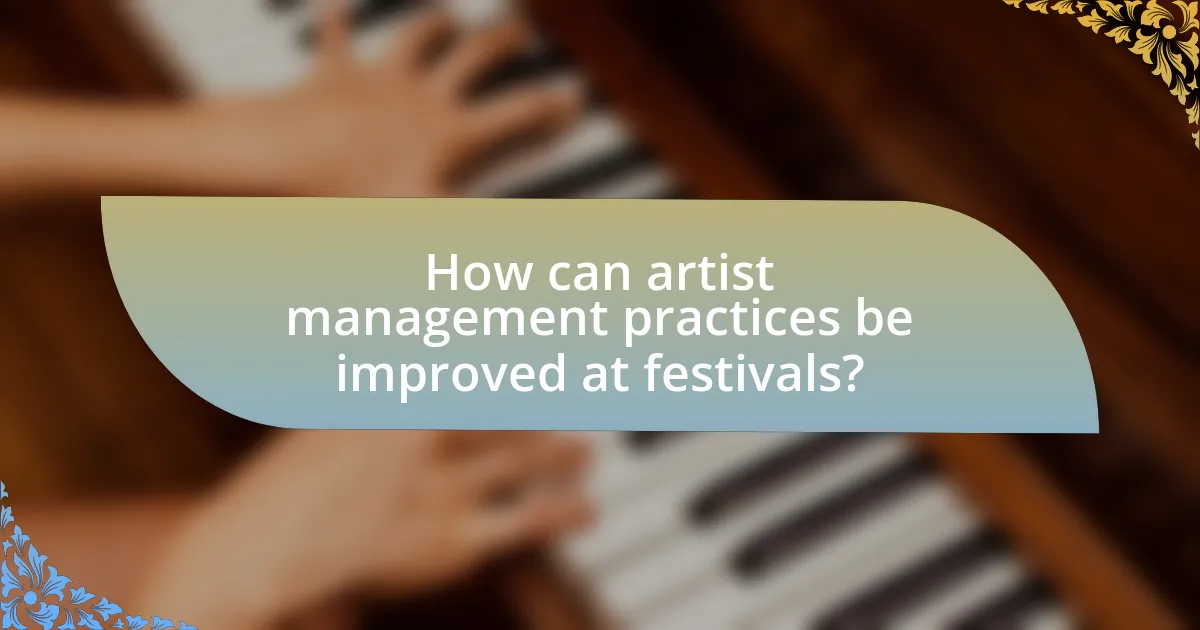
How can artist management practices be improved at festivals?
Artist management practices at festivals can be improved by implementing clear communication protocols and utilizing technology for real-time updates. Establishing designated points of contact for artists ensures that their needs are addressed promptly, reducing confusion and enhancing their experience. Additionally, employing event management software can streamline scheduling, logistics, and artist requests, allowing for efficient coordination. Research indicates that effective communication and technology integration can lead to higher artist satisfaction and smoother festival operations, as evidenced by case studies from major festivals like Coachella and Glastonbury, which have successfully adopted these practices.
What training or resources are essential for artist managers?
Artist managers require training in music business fundamentals, contract negotiation, and marketing strategies. These areas are essential for effectively managing an artist’s career and ensuring their success in the competitive music industry. Resources such as industry workshops, online courses, and mentorship programs provide valuable insights and practical skills. For instance, the Berklee College of Music offers courses on music business that cover essential topics like copyright law and artist promotion, which are critical for artist managers to understand. Additionally, networking opportunities through industry conferences can enhance their connections and knowledge base, further supporting their role in artist management.
How can technology assist in artist management during festivals?
Technology can assist in artist management during festivals by streamlining communication, scheduling, and logistics. Digital platforms enable real-time updates and coordination among artists, managers, and festival organizers, ensuring that everyone is informed about changes or requirements. For instance, mobile apps can provide artists with their performance schedules, set times, and venue maps, enhancing their ability to navigate the festival environment efficiently. Additionally, tools like project management software can help track tasks and deadlines, ensuring that all logistical aspects, such as transportation and accommodations, are handled smoothly. The use of technology also allows for data collection and analysis, which can inform future festival planning and improve artist experiences based on feedback.
What best practices can be adopted from successful festivals?
Successful festivals adopt several best practices that enhance on-site artist management, including effective communication, detailed scheduling, and comprehensive logistical support. Effective communication ensures that all team members, including artists, are informed about schedules, changes, and expectations, which minimizes confusion and enhances collaboration. Detailed scheduling allows for precise time management, ensuring that artists know when and where they need to be, thus optimizing performance times and reducing downtime. Comprehensive logistical support, including transportation, accommodations, and technical requirements, ensures that artists have everything they need to perform successfully, which has been shown to improve overall festival satisfaction and artist retention. For instance, the Glastonbury Festival is known for its meticulous planning and artist care, which contributes to its reputation and success.
How can feedback from artists improve management practices?
Feedback from artists can significantly enhance management practices by providing insights into their experiences and needs during events. When artists share their perspectives on logistical arrangements, communication effectiveness, and overall support, management can identify areas for improvement. For instance, a study by the National Endowment for the Arts found that artist feedback directly correlates with increased satisfaction and performance quality, leading to more successful events. By actively incorporating this feedback into planning and execution, management can create a more artist-friendly environment, ultimately benefiting both the artists and the festival’s success.
What methods can be used to gather artist feedback effectively?
Surveys and interviews are effective methods to gather artist feedback. Surveys can be distributed digitally or on-site, allowing artists to provide structured feedback on their experiences, preferences, and suggestions. Interviews, whether formal or informal, facilitate deeper conversations and can uncover nuanced insights that surveys may miss. Research indicates that direct engagement through these methods leads to higher response rates and more actionable feedback, as artists feel their voices are being heard and valued.
How can feedback be implemented to enhance future festivals?
Feedback can be implemented to enhance future festivals by systematically collecting and analyzing attendee and artist responses through surveys and focus groups. This approach allows festival organizers to identify strengths and weaknesses in various aspects, such as scheduling, artist management, and overall experience. For instance, a study by the Event Management Journal found that festivals that actively sought feedback saw a 20% increase in attendee satisfaction ratings in subsequent events. By integrating this feedback into planning processes, organizers can make informed decisions that directly address the concerns and preferences of participants, leading to improved festival experiences.
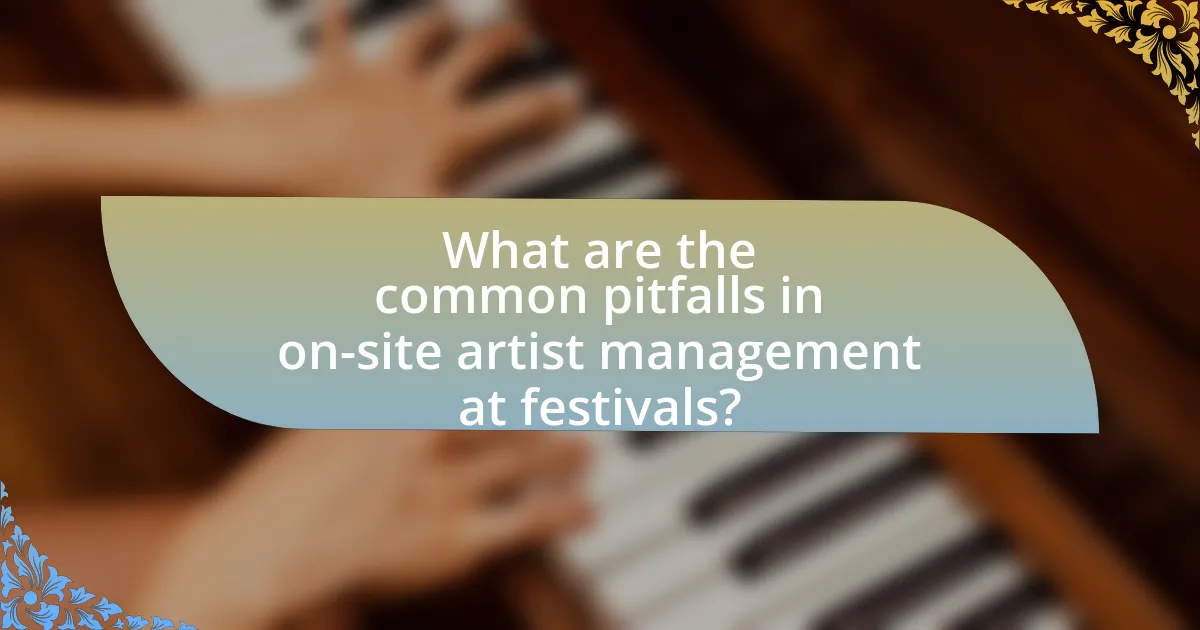
What are the common pitfalls in on-site artist management at festivals?
Common pitfalls in on-site artist management at festivals include inadequate communication, poor scheduling, and insufficient preparation for artist needs. Inadequate communication can lead to misunderstandings between artists and management, resulting in missed performances or unmet expectations. Poor scheduling often causes conflicts, as artists may have overlapping commitments or insufficient time to prepare for their sets. Insufficient preparation for artist needs, such as technical requirements or hospitality, can negatively impact their performance experience. These pitfalls can ultimately affect the overall success of the festival and artist satisfaction.
What mistakes should be avoided to ensure smooth operations?
To ensure smooth operations in on-site artist management at festivals, avoid poor communication among team members. Effective communication is crucial for coordinating schedules, addressing artist needs, and managing logistics. Research indicates that miscommunication can lead to delays and dissatisfaction, as seen in a study by the Project Management Institute, which found that 56% of project failures are attributed to ineffective communication. Additionally, neglecting to prepare contingency plans for unexpected issues can disrupt operations; having backup strategies in place ensures quick responses to challenges. Lastly, failing to establish clear roles and responsibilities can create confusion, leading to inefficiencies and errors in execution.
How can miscommunication be prevented between artists and staff?
Miscommunication between artists and staff can be prevented by establishing clear communication protocols and regular check-ins. Implementing structured communication channels, such as designated points of contact for both artists and staff, ensures that information flows efficiently and reduces the chances of misunderstandings. Regular meetings or briefings before and during the event can help clarify expectations and address any concerns promptly. Additionally, utilizing technology, such as messaging apps or project management tools, can facilitate real-time communication and updates, further minimizing the risk of miscommunication.
What are the consequences of inadequate preparation for artists?
Inadequate preparation for artists can lead to poor performance quality and negative audience reception. When artists are not properly prepared, they may struggle with technical issues, lack of familiarity with the venue, or insufficient rehearsal time, which can diminish their overall presentation. For instance, a study by the National Endowment for the Arts found that artists who engage in thorough preparation are 30% more likely to receive positive feedback from audiences. Additionally, inadequate preparation can result in increased stress and anxiety for the artists, potentially affecting their mental health and future performances.
What practical tips can enhance on-site artist management?
Effective on-site artist management can be enhanced by establishing clear communication channels, ensuring logistical support, and fostering a positive environment. Clear communication involves regular updates and check-ins with artists to address their needs and concerns promptly. Logistical support includes organizing transportation, accommodations, and technical requirements, which are crucial for an artist’s performance readiness. Fostering a positive environment can be achieved by creating a welcoming atmosphere, providing amenities, and encouraging interaction between artists and staff. These practices contribute to smoother operations and improved artist satisfaction, ultimately leading to successful festival experiences.
How can a detailed schedule improve artist management efficiency?
A detailed schedule can significantly improve artist management efficiency by providing clear timelines and organized workflows for all involved parties. This structured approach allows managers to allocate resources effectively, ensuring that artists meet their commitments, such as rehearsals, sound checks, and performances, without conflicts. For instance, a study by the International Journal of Arts Management highlights that well-planned schedules reduce downtime and enhance productivity by up to 30% during events. By minimizing confusion and overlapping responsibilities, a detailed schedule fosters better communication among team members, leading to smoother operations and a more successful festival experience.
What role does empathy play in managing artists effectively?
Empathy plays a crucial role in managing artists effectively by fostering strong relationships and enhancing communication. When managers demonstrate empathy, they can better understand the unique challenges and emotional states of artists, which leads to tailored support and improved collaboration. Research indicates that empathetic leadership can increase job satisfaction and performance; for instance, a study published in the Journal of Applied Psychology found that leaders who exhibit empathy can significantly boost team morale and productivity. This understanding allows managers to create a supportive environment that encourages creativity and reduces stress, ultimately leading to successful festival performances.
